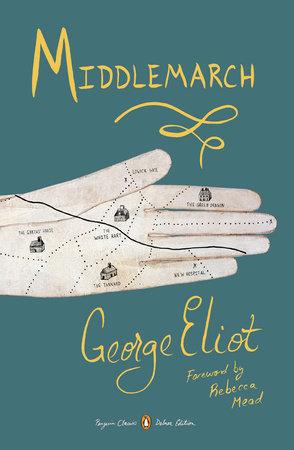Middlemarch (Eliot)

Middlemarch takes place in the town of Middlemarch, England in about 1832 (to give some perspective, Pride and Prejudice is set in about 1812), and tells the stories of several families. In the same way that Austen seems to many times be poking fun at certain people and customs in society, I think there are many times in this novel that Eliot is doing the same, although Eliot’s approach is more serious (for lack of a better word).
I listened to the audio version of this, available through Libby and Hoopla, which was very well done and I enjoyed it a great deal. To be honest, I’m pretty sure I would not have made it through this book if I had tried to read it in print. Due to the time period in which it was written, the language is different, and in many cases, there are a lot more words than writers today would probably use to get across the same point. Because of this, I am glad I went straight to the audio version, as listening to it was much easier than I think trying to read it would have been.
After listening to it, I went in search of a mini-series/movie version, and I did find a Masterpiece Theatre production from 1994 by the BBC (at the time of this writing, it was available on Amazon Prime). It was very good as well, but one thing that I noticed right off was that in the mini-series version they pronounced one family’s name very differently, and another family’s name a bit differently than the narrator of the audiobook had. When I looked up to see how the names were spelled, the way the TV version pronounces them makes much more sense, and makes me wonder why the audiobook narrator pronounced them so differently. It could have been her accent, but I don’t really think so. She pronounced Casaubon (pronounced on TV as Casubon) as “CaSORbin” and Ladislaw as “Ladislor”. Not really a big deal, but it did throw me off for a bit.
Title: Middlemarch
Author: George Eliot
Genre: Classic Literature
Publisher: Signet
Release Date: 1871
Pages: 904
Taking place in the years leading up to the First Reform Bill of 1832, Middlemarch explores nearly every subject of concern to modern life: art, religion, science, politics, self, society, human relationships. Among her characters are some of the most remarkable portraits in English literature: Dorothea Brooke, the heroine, idealistic but naive; Rosamond Vincy, beautiful and egoistic: Edward Casaubon, the dry-as-dust scholar: Tertius Lydgate, the brilliant but morally-flawed physician: the passionate artist Will Ladislaw: and Fred Vincey and Mary Garth, childhood sweethearts whose charming courtship is one of the many humorous elements in the novel's rich comic vein.